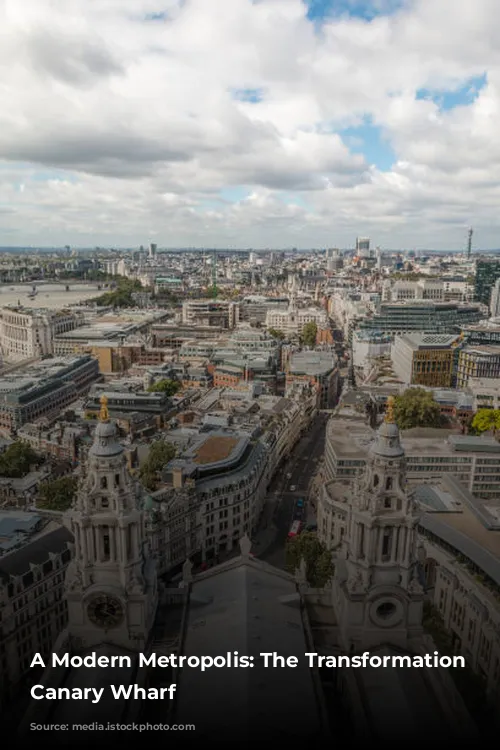Canary Wharf, once a bustling trading hub, has undergone a dramatic transformation in recent decades. It’s a far cry from its humble beginnings as a hub for international trade, a legacy that dates back to the 1800s. The area faced destruction during World War II, which led to a decline in businesses. However, a revival took place in the late 1980s, and Canary Wharf emerged as a center for finance, attracting prominent banks and news organizations.

A Thriving Destination for Everyone
This revitalized district is now a thriving entertainment hub, offering a wide range of experiences. Over 300 shops, cafés, bars, and restaurants line its streets, and a vibrant events calendar fills the year with exciting happenings. From swimming in the open waters of the basin to enjoying outdoor cinemas and art exhibitions, Canary Wharf is a destination in its own right. The arrival of the Elizabeth line has further enhanced its appeal, connecting residents with key locations like Liverpool Street, Paddington, and London Heathrow with ease.

A Home for Young Professionals
Canary Wharf is particularly appealing to young professionals working in both the City and Canary Wharf itself. Its proximity to these employment centers means a shorter commute, while the area also offers competitive housing prices. Many young professionals are drawn to the area’s appeal, opting to buy in Canary Wharf and then move within the neighborhood as their needs change. In fact, our research indicates that a remarkable 76% of domestic buyers choose to stay within Canary Wharf, highlighting its staying power and making it a top London neighborhood.

A Vibrant Lifestyle Destination
Data from Transport for London (TfL) confirms Canary Wharf’s popularity as a lifestyle destination. Last year alone, 67 million people visited the area, a significant increase from the previous year. This data suggests a shift in how people are using the area, with more weekend leisure trips and a growing number of residents who choose to live in Canary Wharf rather than commute in from other areas.

A Variety of Housing Options
The housing stock in Canary Wharf offers a diverse range of options. The majority consists of flats, apartments, and penthouse suites, but the area also features warehouse conversions, a few surviving Victorian terrace houses, and some charming Edwardian cottages. A new addition to the skyline is Aspen, a striking residential complex poised to become one of the tallest in the capital. Aspen offers breathtaking views of the River Thames and the city’s iconic skyline. It is located within Consort Place, a new destination within Canary Wharf.

A Blend of History and Modernity
Consort Place is a modern oasis with landscaped public spaces, including a charming square surrounded by a health center, education facility, and a community hall. Restaurants, bars, and cafés add to the lively atmosphere, and the brand new Dorsett Hotel, set to open in February 2025, will offer its services to both hotel guests and Aspen residents. The area also boasts a unique piece of history: the North Pole public house. This historic pub, originally opened in 1860, is one of the few remaining pubs from the golden age of the London docks. It is being meticulously restored to its former glory.

Seamless Travel Options
Canary Wharf offers residents and visitors a wide range of transportation options. Besides the Elizabeth line, the area is well connected by the Jubilee line, the Docklands Light Railway (DLR) via Canary Wharf Station, providing swift access to Central London in just 10 minutes. For those who prefer water travel, the Thames Clipper by Uber boat services from Canary Wharf Pier connects you to destinations such as Greenwich, London Bridge, Chelsea Harbour, Vauxhall, Embankment, and Blackfriars piers. For further travel, London City Airport is conveniently located.

A Modern Success Story
From its humble beginnings as a trading hub to its transformation into a vibrant and bustling lifestyle destination, Canary Wharf has become a modern success story. It is a testament to the power of regeneration and a shining example of how a city can adapt and thrive. With its blend of history, culture, and modern amenities, Canary Wharf continues to attract residents, visitors, and businesses alike, securing its place as a leading neighborhood in London.






